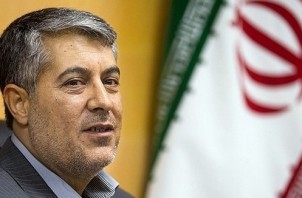April 21, 2017
by Warren L. Nelson

In its second set of sanctions since taking office, the Trump Administration last week imposed sanctions on the Tehran prison system and on Sohrab Soleymani, the brother of the Qods Force commander, who is a prison official.
The Republican leadership has been looking for people and institutions to sanction in Iran for missile work, terrorism, human rights violations and regional destabilization—just about anything that doesn’t involve nuclear work, since the nuclear agreement that went into effect last year forbids new nuclear sanctions, but only nuclear sanctions.
The United States imposed the new sanctions on just one man and one institution last Thursday, the day after the European Union announced it was renewing its sanctions on Iranians for human rights violations for another year,
While the EU has sanctioned 82 Iranian nationals and one entity for human rights violations, the United States has only sanctioned 19 people and 17 institutions before last week. So, it is far behind the EU.
The US sanctions—like all these sanctions on individuals—are actually very mild. They bar Americans from doing business with them—which Americans are already forbidden to do—and they freeze any and all assets of the sanctioned entity in the United States. Sanctions have been imposed on hundreds of Iranians for all sorts of reasons, but the Treasury, in its annual report, has not cited any assets that have ever been found and frozen.
In other words, these kinds of sanctions are mostly for show, not substance.
Dr. Walid Phares, who was a foreign policy adviser to the Trump campaign but has not gotten a job in the Trump Administration, said, “These sanctions mark a clear change of policy between the Trump Administration and the past Obama Administration, which had abandoned the Iranian people since 2009,” when Obama was inaugurated.
But that is not true. The sanctions Trump imposed were announced under the authority of Executive Order 13553, which was signed by Obama in September 2010. And all the 19 people and 17 institutions previously sanctioned for human rights violations were sanctioned by Obama.
But, whether done under executive orders signed by Presidents Clinton, Bush or Obama, they remain mere knuckle raps of no real significance.
Sohrab Soleymani, the younger brother of Qods Force Commander Qasem Soleymani, is currently the “supervisor of the office of the deputy for security and law enforcement of the state prisons organization.” But he came to US attention previously when he was head of the Tehran Province Prisons Organization in April 2014, a time when dozens of guards rampaged through Ward 350 of Evin Prison, where political prisoners are kept, and injured more than 30 prisoners, the Treasury Department said.
Major figures sanctioned by Obama for human rights violations include Mohammad Ali Jafari, then commander of the Pasdaran, Sadeq Mahsouli, then interior minister, Gholam-Hossain Mohseni-Ejai, then minister of intelligence, Saeed Mortazavi, then the Tehran prosecutor, and Ezzatollah Zarghami, then chief of state broadcasting.
In Tehran, Foreign Ministry spokesman Bahram Qasemi last week said the Americans had no right to even comment on human rights standards in Iran because of their own gross violations of human rights.
The Trump Administration earlier sanctioned several individuals and entities—mostly non-Iranians—for helping Iran’s missile program. They were issued immediately after an Iranian missile test. That list of people and institutions to sanction had been drafted long before by the Obama Administration to be used whenever there was another missile test.
